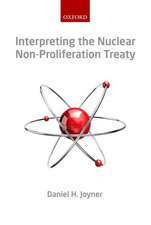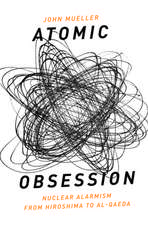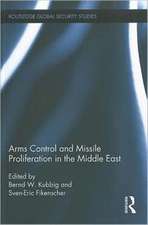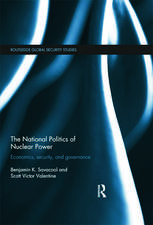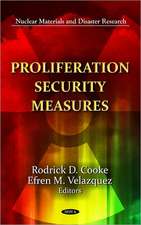The Evolution of Arms Control: Weapons of Mass Destruction
Autor Richard Dean Burnsen Limba Engleză Paperback – 6 iun 2013
| Toate formatele și edițiile | Preț | Express |
|---|---|---|
| Paperback (1) | 405.89 lei 6-8 săpt. | |
| Rowman & Littlefield – 6 iun 2013 | 405.89 lei 6-8 săpt. | |
| Hardback (1) | 322.49 lei 6-8 săpt. | |
| Bloomsbury Publishing – 21 iun 2009 | 322.49 lei 6-8 săpt. |
Preț: 405.89 lei
Nou
Puncte Express: 609
Preț estimativ în valută:
77.67€ • 83.05$ • 64.76£
77.67€ • 83.05$ • 64.76£
Carte tipărită la comandă
Livrare economică 18 aprilie-02 mai
Preluare comenzi: 021 569.72.76
Specificații
ISBN-13: 9781442223790
ISBN-10: 1442223790
Pagini: 251
Dimensiuni: 152 x 227 x 21 mm
Greutate: 0.4 kg
Editura: Rowman & Littlefield
Seria Weapons of Mass Destruction
ISBN-10: 1442223790
Pagini: 251
Dimensiuni: 152 x 227 x 21 mm
Greutate: 0.4 kg
Editura: Rowman & Littlefield
Seria Weapons of Mass Destruction
Cuprins
Descriere
Written in an engaging and accessible manner, The Evolution of Arms Control weds an inductive analysis of arms control systems to a general history of arms control from 883 BCE to the present. Comparing past and present challenges, it highlights recurring issues such as negotiation, verification, and compliance.
Caracteristici
15 illustrations
Notă biografică
Richard Dean Burns is professor emeritus of history at California State University, Los Angeles, CA. He is the coauthor/co-editor of 12 books, including Praeger's Reagan, Bush, Gorbachev: Revisiting the End of the Cold War and ABC-CLIO's Arms Control and Disarmament: A Bibliography.
Recenzii
Written for anyone interested in arms control and disarmament issues as well as military history, this book reviews the historic means and techniques for arms control such as demilitarization, regulation of arms manufacturing, stabilizing international environments and the outlawing of war. A section also reviews nuclear weaponry before and after the Cold War and the emergence of biological and bacterial delivery systems.
History has shown that war is terrible, but it would be even be more horrifying if nations had not attempted to placelimits on armed conflict. Few readers could have imagined the painstaking negotiations involved in reachingagreements placing restrictions on weaponry, torture, and other unsavory components of modern war until Burns, arecognized expert in foreign and national security affairs, published this new book. The author (emer., history,California State Univ., Los Angeles) highlights the historical antecedents that are at the heart of modern weaponscontrol accords. But he goes further than that and outlines how victors sought to disarm their former adversaries, asRome did with Carthage following the Punic Wars or the Allies did in Germany after WW II. Today, however, theissues are more complex and require considerable engagement on the world stage. Burns chronicles the progressionof arms negotiations, allowing readers to visualize the intricacy of arms control and grasp the difficulties of findingcommon ground in preventing the spread of nuclear weapons. Whether the world's diplomatic efforts will besuccessful remains to be seen. Still, a major contribution. Summing Up: Highly recommended. All levels/libraries.
History has shown that war is terrible, but it would be even be more horrifying if nations had not attempted to placelimits on armed conflict. Few readers could have imagined the painstaking negotiations involved in reachingagreements placing restrictions on weaponry, torture, and other unsavory components of modern war until Burns, arecognized expert in foreign and national security affairs, published this new book. The author (emer., history,California State Univ., Los Angeles) highlights the historical antecedents that are at the heart of modern weaponscontrol accords. But he goes further than that and outlines how victors sought to disarm their former adversaries, asRome did with Carthage following the Punic Wars or the Allies did in Germany after WW II. Today, however, theissues are more complex and require considerable engagement on the world stage. Burns chronicles the progressionof arms negotiations, allowing readers to visualize the intricacy of arms control and grasp the difficulties of findingcommon ground in preventing the spread of nuclear weapons. Whether the world's diplomatic efforts will besuccessful remains to be seen. Still, a major contribution. Summing Up: Highly recommended. All levels/libraries.
















